Study is to look at something to learn more about it.
The purpose of study is to get to understand something and to be able to use what one has learned.
The final objective when studying is to apply what one has learned. The study is successful to the degree that one can apply what one has learned. Studying without application is meaningless.
Studying is different from reading. One might read something for varying reasons. Maybe to be entertained, to pass time, or to take one's attention off other things. This should not be confused with studying.
A student is an individual who is studying a subject to be able to apply it. He performs the act of studying over a period of time.
So, one studies to learn something. Learning something means that one gains an understanding about something and an ability to do something in the area. The reason for studying is just that and nothing else. If one doesn't wish to understand and apply the materials there is no point in studying.
The best studying is when one accomplishes understanding and application with the least possible effort.
![]()
Before you can start studying something you must recognize that there is something you don't know. You must be able to see that there is a gap in your knowledge that you wish to fill. If you don't notice it or if you don't wish to fill it you won't get very far.
So, first realize that you don't know. Get a feel for what it is that you don't know and what you plan to do about it. That might or might not be easy to do, but it has to be done.
No subject can be successfully studied from a viewpoint of "knowing it all". You are not likely to learn if you think you already know it. If you already knew it all there would be no point in studying. If you already know a lot, that is fine, but in studying you would concentrate on what you don't know.
To start studying one must recognize that there is something there to be studied. There is a subject there. The subject matter must be somewhat real to you before you start. You must ascertain for yourself that the subject exists.
Study requires that you confront the subject. You must be able and willing to stand up to it, look it in the eyes, and tackle it.
Next you must intend to learn the subject. You must have a self-propelled drive to get through the subject. You must intend to succeed in the subject. You must want and desire to learn.
Your own desire to learn the subject is what allows you to make your own choices as you progress through the subject. Don't study for anybody else's sake, study for you.
To summarize:
1. Realize that there is a subject there
2. Realize that you don't know everything about it.
3. Confront the actual subject
4. Intend to learn about it.
These points need to be maintained throughout one's study. However simple they are, they are the foundation
on which your progress is based.
![]()
Traditional study techniques are often centered around the idea of an acceptable percentage of retention. It goes like this:
You retain a certain percentage of what you have read after first reading it, let's say 70%.
After a week your retention has dropped to something like 50%.
After a year you retain maybe 30% of what you studied and that is what you have learned.
It is usually implied that the retained 30% is what is expected and that it is acceptable.
Various improved techniques of study increase the percentage of retention or the speed of study. Speed reading is one such example.
The problem with all of this is that the purpose of studying is left out. Studying is regarded as reading: an activity where you go through a certain amount of words and some of them stick and you achieve a desirable benefit from that.
Unfortunately understanding and application aren't understanding and application when they are less than 100%. Either you understand or you don't understand. Either you do it or you don't do it. There are of course degrees of perfection in doing that, but they have very little to do with the retention in reading.
When you do a certain activity and somebody gives you a direction you need to understand the direction. "Press the red button" means "Press the red button", not "Push the blue lever". "Service the brakes" means "Service the brakes", not "Rotate the tires". If you don't understand the subject you won't last long in any practical field. Some subjects are more forgiving and will allow you to be an imposter without anybody noticing. That doesn't change the fact that understanding is either there or not there.
Application works the same way. You won't have success as a plumber if you can't do plumbing. If you only fix
people's plumbing 50% you will have many unsatisfied customers.
![]()
Affinity, Reality, Communication
There are three aspects of life that are very basic to understanding it and improving it.
They are Affinity, Reality and Communication.
Affinity is the degree of closeness or of liking someone or something.
Reality is the degree of agreement about how things are, the shared beliefs.
Communication is interchange of ideas or particles.
Affinity, Reality and Communication are components of any relationship. Relationships between individuals, groups, countries, between people and objects, subjects or concepts, etc. Anywhere where you find several independent units in some proximity to each other you are going to find a degree of Affinity, Reality and Communication between them.
Affinity, Reality and Communication add up to Understanding. When we have a large amount of each we have a high degree of understanding. If we we have little of each there is a low degree of understanding.
We describe the relationship between affinity, reality and communication as a triangle. The three corners represent (A)ffinity, (R)eality and (C)ommunication respectively. Therefore we call it the ARC Triangle. The total triangle represents (U)nderstanding. A+R+C=U.
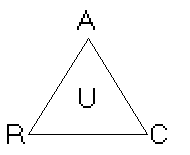
The reason we use a triangle to represent A, R and C is that there is a connection between them. You will find that it is very difficult to have one without having the other. And if you improve or diminish one of the three the other two will follow.
You will find that you are more in agreement (R) and can talk better (C) with people you really like (A) compared with people you don't like very much (low A).
And if you share many ideas (R) with a person it is much easier to have a conversation (C) and you probably like (A) the person.
If you have a lot of interaction (C) with a person you are likely to get more common reality (R) and are likely to be closer (A) to the person.
Now, the connection between A, R and C gives us a way of improving them. If you improve one corner of the triangle you will also improve the other two. In other words, if we want to improve a specific aspect we can do it by improving one of the other two. We can lift the whole triangle by lifting one of the corners.
Let us say you would want a specific person to like you better. If you were working exclusively on that, by trying to appear more likeable and so forth, you might have a hard time at it. However, with a little knowledge of ARC we can take different approaches. The easiest entry point into the triangle is communication. The more you communicate with someone the closer they get to you (A). Likewise, the more real (R) you are to someone the higher the ARC is. If you choose a subject they have some agreement with (R) you stand a much better chance of getting to talk with them (C) and having them like you (A).
The most important of the three corners is Communication. It is the easiest and most direct way of increasing or decreasing understanding. By communicating you can increase A, R and U. But any of the three corners is able to lift up the triangle.
Let us look a little more at what the three concepts really encompass.
Affinity is best described as the willingness to be close to. That is often manifested as a high degree of liking or love. However, it can also have more negative connotations There is a whole scale of emotional possibilities. Affinity is best measured by the intensity of emotion, not by the type of emotion. Two people who hate each other and who right now are having a fight actually have a high A at that point. And incidentally they have a solid agreement (R) about fighting. And they are probably exchanging a lot of blows, insults and various flying objects, that is C.

You have low affinity for people you aren't willing to be around, people with very foreign ideas, people you couldn't imagine interacting with. You have high affinity for the people you want to be with. Friends and associates you have picked yourself, subjects you are interested in, that signifies high affinity.
Reality is the degree of agreement. In this regard we are more interested in people's considerations about things than how things "really" are. The physical reality is really just what most people agree on, anyway.
If two people use a very similar frame of reference they have high R. Two physicists can discuss physical phenomena with a high degree of reality. Either one of them might have trouble discussing the same phenomena with a ballet dancer.
Now, high reality between two people doesn't necessarily mean that they fully agree on what they are talking about. If they totally agreed there wouldn't be much point in talking about it. It is rather that they agree on the context. Their picture of the world is similar, they can see the same things. They are willing to explore the other person's ideas.
As mentioned, high reality doesn't have to have anything to do with what is generally accepted as true. Two patients in a mental institution might agree thoroughly (R) that the Martians just landed on the front lawn, and they might get along very well (A) and talk lengthily about it (C). The judgment of others has nothing to do with the degree of reality between two people.
So, Reality is agreement on context, the degree to which people live in the same world. Somebody who has very different beliefs will seem unreal to you.
Communication is the interchange of particles. In the ARC triangle C is the quantity of communication. The communication can also have different quality characteristics, that is the particles can be anything from ideas or feelings, to solid objects.

Part of the formula of communication is also a certain distance between the communicating parties. That goes hand in hand with affinity. Actually the greater the perceived distance, the lower the affinity is.
Also communication isn't possible unless there are at least some common ground rules. That is reality. The recipient of communication must at least agree that he can be communicated to. And the communicator must agree that there is somebody there to communicate to. Also, communication is successful to the degree that it is duplicated (received as it was sent), which is again reality.
Understanding is a combination of affinity, reality and communication. It is agreement of closeness and interchange. It is close interchange with someone you share ideas with. It is willingness to be with people who make some sense to you so you can talk with them.
To understand a person or a subject you need to have the three component parts in balance. If one part is left out there won't be any understanding.
As an example, let's say you wanted to understand how it is to be an auto mechanic. The best approach would be to get close to some auto mechanics. So, you could go to a garage, that will improve A. Now, you could talk to the mechanics there (C) and find out what they are doing and what they think about it (R). By gradually increasing each of the three corners of the ARC triangle you could end up understanding auto mechanics very well.
On the other hand, if you had started out by deciding that you didn't like auto mechanics because they have dirty hands and curse a lot, you probably wouldn't get very far. Even if you tried to drop out just one corner of the triangle you wouldn't make it. Say you went to the garage and talked a lot with the mechanics about the weather and became quite friendly with them. However, you decided that car repair isn't something you would be able to know about, and you didn't understand the terms they were using. You used A and C, but you put a block on R. You wouldn't get to understand what they were doing.
If any part of the ARC triangle is cut off we have what is called an ARC Break. In human relations that is commonly known as an upset. If you are used to being in ARC with someone or something, and then suddenly one of the elements drop out, you are likely to feel upset. Identifying which part of the ARC triangle was broken will tend to remedy the situation somewhat.
To deal effectively with situations in life, knowledge about ARC is vital. The principles of ARC are always in action in any part of life in this universe. If you know about and use these simple principles you have a much better chance of success in what you do.
If you attempt to have maximum ARC and minimum ARC Breaks with people around you, you are likely to accomplish a lot.
So, how do you get into ARC with a new person you haven't met before?
Well, you can start out by allowing the person to be there. If you grant the person the right to exist, to be the way he is, and to be in your vicinity you have laid the foundation for affinity. Said differently, if you start out with a positive interest in the person you will get further.
Before engaging a stranger you might give some thought to possible common reality. Which subjects could you talk about that would be acceptable to both of you. You wouldn't want to overwhelm the person with unreal concepts. Your appearance is also part of the reality. If your way of dressing or your haircut is unreal to the person it will take longer to accomplish understanding.
Now, most importantly, you need to talk with the person. That must go both ways: you tell him something, and he tells you something. And you have to be willing to hear his viewpoints and to convey your viewpoint to him.
By continued interchange one will naturally achieve more understanding.
The things to avoid would be rejecting the person, enforcing one's own reality, compulsive talking and so forth. They would be likely to lead to ARC breaks.
So, use the simple principles of the ARC triangle and life will be easier.
Now, ARC has a lot to do with study also. Since A, R, and C form Understanding we can assume that one needs to have Affinity, Reality, and Communication with a subject one wants to understand.
You have to be close to the subject and you have to have a degree of likingness towards it, that is affinity. You can't learn about something you have no exposure to or that you don't want to have any exposure to.
You must communicate with the subject. That means you must interact with it, learn about it, try to do something with it, and so forth. You must allow the subject to communicate to you in order to learn something about it.
You need to establish some reality with the subject. To start out you need to have some agreement on what the frame of reference is. Where does this subject fit in, what class of subject is it. As you continue studying it you will increase your reality on what it is and you will most likely be more in agreement with its existence and its data.
Through the application of affinity, reality, and communication you gradually gain the understanding you are
seeking. During the course of your learning communication is the part you will emphasize. The actual learning takes
place by interacting with the subject.
![]()
Data have different importances. Some things are more important than others.
One of the major mistakes you can make in studying is to assign everything the same importance.
The importance is how central the datum is to the subject, how much other data build on it, and how indispensable it is.
The importances are in most subjects relatively few and buried in large amounts of less important data. Some subjects have a higher concentration of importances, such as law.
Evaluating the relative importance of individual data is essential when studying. Assigning a uniform importance to all data is not workable and will not lead to understanding and application.
It is advisable when studying to continuously evaluate the importance of what you study. What does each datum really mean to the subject, how central is it, what class of datum is it.
We can divide any subject into elements of varying importance:
Basic Principles:The underlying essentials of the subject. The invariable axioms. These must be known and fully understood.
Doingness:What one must be able to do in the subject. The actions, skills, activities, and methods involved. These must be learned and mastered.
Explanations:Further discussion of the principles and doingnesses. That is necessary and useful to understand the subject. They must be understood in order to fully understand the essentials. Beyond that they have less importance.
Examples:Examples might illustrate what is being taught and give you a more full conceptual understanding. However, they aren't the material itself. They can be useful for future reference.
Opinion:The writer might have opinions about things. These might be interesting, but aren't necessarily important compared to the data being taught.
Filler:Study materials might include any other data that have no relevance to the subject. It might be small talk, casual remarks, elaborate embellishments, or such. These are not important.
There is a drastic difference in importance between basic principles and opinions about unrelated subjects. However, they might be in the same print in the text and they might not be given different emphasis. It is often up to you to place the emphasis where it is due.
You can make your own divisions of elements in the specific subject you are studying. You just need some system to sort out the importance of each datum.
This sort of division of elements gives you an idea of what you need to master fully and what you don't have to worry so much about.
Basic Principles and Doingnesses have to be understood and mastered 100%. You have to know and retain these things fully. If you don't know them you can't apply the material.
Anything but basic principles and doingnesses is there to help you understand the subject better while you are studying it. The purpose of explanations, examples, opinions, and filler is served when you are done with your study. As long as you understand those parts when you study them 100% retention of them is not necessary.
So, in studying be sure to evaluate the relative importances of data. The data that are important, learn them 100%. And the data that are less important they are, well, less important. Understand them, but don't take them too seriously.
• Compare data with each other.
• Compare data with other data you know.
• Establish which type of data you deal with.
• Place them at the right level of importance.
• Learn the data as thoroughly as the level of importance indicates.
Intelligence is the ability to evaluate relative similarities and differences.
Stupidity is the lack of the ability to ascertain similarities and differences. It is the erroneous assignment of difference to data that are similar, and the erroneous equation of data with each other when they are really different.
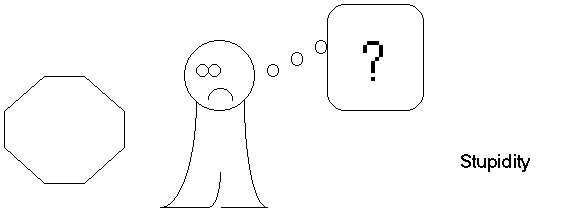
Intelligence depends both on one's inherent ability and on one's learned habits of interacting with one's surroundings.
One can work at establishing relative similarities and differences and thereby act more intelligently
A biologist can be very intelligent about observing animals because he has studied which classes they fall into. He knows their similarities and he knows how each species differ from the other.
To evaluate a datum you need to have something to compare it to. You wouldn't know what to do with it unless you relate it to something else. You need at least one datum of similar type and comparable magnitude. If you have other data in a similar class you can then observe the similarities and differences. That allows you to categorize the datum correctly and to learn from it.
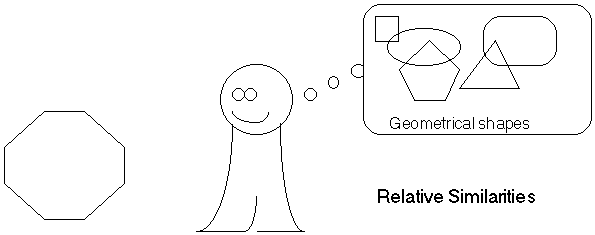
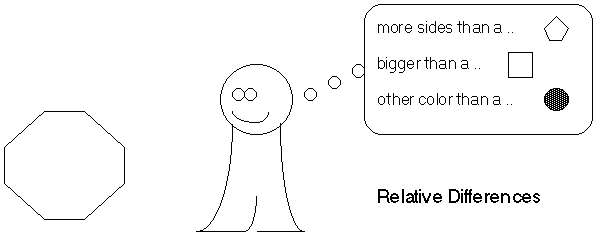
There are three major barriers that one is likely to run into in studying. They are:
• Mis-understood Words
• Skipped Gradients
• Lack of Mass
The majority of all study problems fall in one of these categories.
The first and most important barrier is the mis-understood word. If in studying you go past a word you don't fully understand, if you notice it or not, subsequent parts of the text will blank out on you. Your memory of what you have studied will have holes in it and you will have a feeling of emptiness concerning the subject.

The handling on mis-understood words is to locate them and get them fully defined
The second barrier to study is the skipped gradient. If you get in over your head, that is without having gone through all the steps required, you will end up with a feeling of confusion. You attempted too steep a gradient of learning, you got too much data you couldn't digest, and you got confused.
The solution to a skipped gradient is to go back to the point where the material wasn't confusing and go through it more gradually.
The third barrier to study is lack of mass. The mass is the subject matter we are studying, the thing itself, the physical objects etc. If you study without having enough exposure to the actual mass you will end up feeling squashed or dizzy.
To fix a lack of mass we must bring the student into contact with the subject matter or with a suitable substitute for the subject matter.
Each study barrier has some very definite symptoms and some very exact methods of remedy.
![]()
A mis-understood word is a bypassed definition. It is a word you don't fully understand the meaning of.
The phenomena of the mis-understood word is quite obvious but remarkably overlooked. It basically comes down to: you don't understand what you study if you don't understand what you study.
It doesn't depend on percentages. Just because you understand 95% of the words doesn't mean that you understand 95% of the materials. Even 1% of mis-understood words can destroy 99% of your understanding.
The effect of a mis-understood word goes far beyond the word itself.
If you go past a word that isn't fully understood your attention will sub-consciously stick to that word. You are likely to not notice what you are reading right after that point.
Blank spots will follow from mis-understood words. Your memory will have holes concerning the material. You might feel blank or empty about what you studied. And it is unlikely that you will be able to understand and apply the materials to amount to much.
A mis-understood is not necessarily obvious. The words you clearly know that you don't understand are not the worst. Much more insidious are the words you have an imperfect understanding of. You might have the wrong definition, a partial definition, an uncertain understanding, or whatever.
Simple words are particularly dangerous. Very often one has never bothered to fully understand them. They are taken for granted. An incomplete understanding of a word like "for" or "the" can wreck havoc on one's understanding of a subject.
If in studying a text you start to feel blank, nervous, upset, or you start to yawn - it is time to look for a mis-understood word.
The solution is to go back to the end of the part where you were not having trouble. The mis-understood word will be found right after that. There is a word there that needs to be defined correctly.
When you find a possible mis-understood word you need to look it up. You find it in a good dictionary and you get it fully defined. You must understand its definition fully and you must understand the use of the word in the text at hand.
If you are aware of mis-understood words and if you locate them and define them as soon as (or before) you get the symptoms you can feel bright and comprehending about any subject you study.
If you continuously go past mis-understood words the symptoms will compound. You will not only feel blank and washed-out, you will start disliking the subject. It is not really fun anymore, it bores you or upsets you. If you continue any further you will start complaining and blaming the subject or others for your trouble. And eventually you will leave, you will drop the subject and not want to come back to it.
If you are forced to keep studying you might develop ways of memorizing the material and even pass tests. But, you are no longer with it, and you won't be able to apply it.
A mis-understood is known for short as an M.U.
![]()
The Symptoms of Mis-Understood Words:
A blank feeling,
A washed-out feeling,
A not-there feeling,
A nervous hysteria,
Yawning,
Tiredness.
Gradients are when you move ahead one step at a time. You can accomplish anything if you can lay out the steps from where you are to where you want to go and then follow the steps one by one.
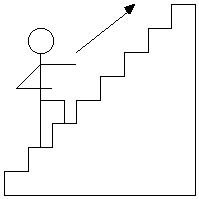
When you study something on a gradient each step is designed to include a little bit more than the step before
it. It will be more difficult or require more of you. If you follow all the steps you will end up with the level
of skill and accomplishment you want
This applies mostly to actions and practical skills, but also to theoretical study. If you want to learn to swim it really works the same way as if you want to master nuclear physics.
If you are going to learn to swim you would start by looking at some water, maybe dip a toe in it, stand in water to your knees, gradually put your whole body in the water, move a bit around in shallow water, try to float, practice swimming strokes, start swimming, and sooner or later you can swim.
If you study a more theoretical subject you would probably wish to start with some of the basics explained in simple terms, some examples of the use of this subject, some basic definitions, some pictures, and you would gradually work into more and more advanced presentations of the subject.
Unfortunately subjects aren't always presented that way. Some textbooks seem to assume that you already know the subject and overwhelm you with information without regard to the order of presenting them. Also, materials might be missing that you really need. Nevertheless the same mechanisms are at work.
If you study something at too steep a gradient you will be hit by confusion and overwhelm.

It is like trying to learn to swim by being thrown into the sea without any introduction. You are not likely to
like it, things are moving too quickly for your taste
If you have a choice in the matter you can make things much easier for yourself by selecting a study route that is built on a manageable gradient of steps.
No matter which study program you are following you are still subject to the phenomenon of the skipped gradient. You might without noticing go on to the next step without mastering the one before it.
Skipped gradient is recognized by a confused feeling, reelingness, a mixed-up feeling.
Often one will attribute all one's trouble to the step one is at. But, if we are talking skipped gradient it is the step before that needs to be looked at. The last step where one was doing well before one started to be confused.
The solution to skipped gradients is to go back and find the missed gradient and to fully master that one before
one goes on.
![]()